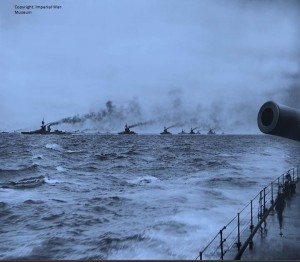Since the beginning of this February a research project re-connecting Portsmouth to First World War was carried out by the University of Portsmouth’s Psychology department. The project was funded by the Heritage Lottery Fund’s programme called ‘First World War: Then and Now‘, through which several grants were awarded to mark the centenary of the World War 1. As Portsmouth is a historic sea-side city, the main focus of the research was on naval history. However, the project aimed to raise people’s awareness about the experience of the war generally. Thus, in addition to naval battles, several aspects of war-time Portsmouth, such as spying, land battles, women’s role and cultural life were looked at as well, all aiming to make the experience of the war more realistic to visitors.
The research was conducted by three different groups of people: senior citizens, students, and schoolchildren, in order to encompass various age groups and see how different generations remember and perceive the image of the Great War. As the project included research methods from both history and psychology, the collected information was easily accessible to everyone as it looked at the war through the eyes of a non-academic person, linking it to the history of below and social history. Although the research was concerned with local history it added considerably to the bigger picture of the war as the personal accounts helped to bring the reality of the war ‘closer’ to people. In other words, when global and political history might seem far and inaccessible for locals, then this research made it easier for Portsmouth citizens to relate to the war by linking it to their hometown, and in some cases, to their ancestors.
 As mentioned, one of the most important aspects of the research was to make people think how the war is remembered, both on collective and individual level. An English novelist, Helen Dunmore explained in her article “First World War made us who we are” how misleading the impression of war can be. [1] Hundred years ago, the war was served to people as something heroic; war-time advertisements and media aimed to encourage young men to join the army by over-glorifying the war. Even nowadays, the picture which, for example Hollywood is painting of war for masses is simply romantic: brave men go to war and beautiful women wait for them at home. In reality, war was something quite different and horrible when looked at on a personal level – a fact that is one of the points made in Dunmore’s novel and also something that came clear from the given project’s research. Many young men whose personal accounts were found described war as ‘hell with the lid off’ and ‘hell on earth.’
As mentioned, one of the most important aspects of the research was to make people think how the war is remembered, both on collective and individual level. An English novelist, Helen Dunmore explained in her article “First World War made us who we are” how misleading the impression of war can be. [1] Hundred years ago, the war was served to people as something heroic; war-time advertisements and media aimed to encourage young men to join the army by over-glorifying the war. Even nowadays, the picture which, for example Hollywood is painting of war for masses is simply romantic: brave men go to war and beautiful women wait for them at home. In reality, war was something quite different and horrible when looked at on a personal level – a fact that is one of the points made in Dunmore’s novel and also something that came clear from the given project’s research. Many young men whose personal accounts were found described war as ‘hell with the lid off’ and ‘hell on earth.’
Similar to Dunmore novel’s idea, one of the visitors, an elderly lady, gave a very touching and accurate feedback by saying that the exhibition “gave her a taste of the situation which the personal accounts help to make very realistic, a thing which is very important in order to realise how people felt. It is also so important to really understand the suffering as well as the ability of the human spirit to rise above adversity.” Her comment sums up the overall aim of the research and exhibition which was to make people not only know what the war was like, but more importantly, what it felt like to be in the war. Probably the war was a terrifying experience but it is necessary to remember that in spite of the horrors which the soldiers, and the society in general went through, people still tried to cope with the loss and carry on their everyday lives as normally as possible. In short, this project and exhibition aimed to make the experience of the war as realistic as possible to people, especially to Portsmouth citizens to honour the locals who once gave their life in the war.
The full research with personal accounts from Portsmouth citizens, naval and land battles, spies, and everyday life and women can be found here
 About the Author: Eret Talviste is originally from Estonia, and was an undergraduate student at Portsmouth University for the last three years, receiving a degree in History and English Literature July 2014. During her studies, Eret realised that she is most fascinated by contemporary history and literature. As the project on WW1 allowed her to research a historical event from a slightly different, psychological, or even literary perspective, Eret decided to assist Dr. Lorenzo Stafford with it. This September Eret will continue her studies at Glasgow University to undertake a Master’s Degree in Modernities: Literature, Theory and Culture.
About the Author: Eret Talviste is originally from Estonia, and was an undergraduate student at Portsmouth University for the last three years, receiving a degree in History and English Literature July 2014. During her studies, Eret realised that she is most fascinated by contemporary history and literature. As the project on WW1 allowed her to research a historical event from a slightly different, psychological, or even literary perspective, Eret decided to assist Dr. Lorenzo Stafford with it. This September Eret will continue her studies at Glasgow University to undertake a Master’s Degree in Modernities: Literature, Theory and Culture.
References











Comments are closed.